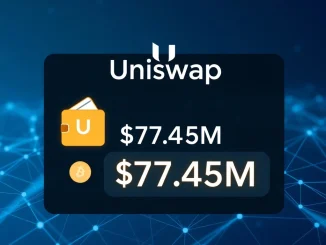
The crypto world is watching closely as WazirX, a prominent crypto exchange, faces a significant setback. The Singapore High Court recently delivered a crushing blow by rejecting the exchange’s proposed restructuring plan. This decision sends ripples through the community, particularly for users affected by a major hack and those hoping for a path to recovery through the plan.
WazirX Faces Legal Hurdle After Major Hack
WazirX, known for serving a large user base primarily in India, has been navigating turbulent waters since suffering a massive security breach. The exchange, based in Singapore, was targeted in a sophisticated attack in July 2024. This incident resulted in a staggering loss of $230 million, attributed to the infamous Lazarus Group.
The Devastating WazirX Hack by Lazarus Group
The $230 million WazirX hack stands as one of the largest single exchange breaches in recent history. Investigations pointed towards the Lazarus Group, a cybercrime organization linked to North Korea, notorious for targeting cryptocurrency platforms globally. Such attacks highlight the persistent security challenges within the digital asset space and the advanced threats faced by exchanges holding significant user funds.
Key points regarding the hack and its aftermath:
- Target: WazirX exchange infrastructure.
- Attributed To: Lazarus Group.
- Amount Lost: $230 million.
- Date: July 2024.
- Impact: Led to severe financial distress for the exchange, necessitating a recovery plan.
Understanding the Proposed Crypto Restructuring Plan
In the wake of the hack, WazirX sought a crypto restructuring plan to manage its financial difficulties and potentially facilitate the recovery or compensation of lost user assets. A restructuring plan in this context typically involves negotiating with creditors (including users who lost funds) to propose a method for repaying debts or distributing remaining assets over time. The goal is often to avoid liquidation and find a path forward for the company.
WazirX’s proposal had seemingly strong support, with reports indicating over 93% of voting creditors approved the plan. This level of support usually signals a high likelihood of court approval, as it reflects the collective will of those most impacted.
Why the Singapore Court Rejected the Plan
Despite overwhelming creditor support, the Singapore court ultimately rejected WazirX’s restructuring proposal. While the specific reasons detailed by the court are crucial, rejections can stem from various factors even with high creditor approval:
- Feasibility Concerns: The court might have found the plan unrealistic or incapable of achieving its stated goals.
- Legal Technicalities: Issues with the plan’s structure, documentation, or compliance with Singaporean law.
- Public Interest: The court may consider broader implications beyond creditor interests, such as regulatory concerns or the integrity of the financial system.
- Fairness: Despite the vote, the court might perceive the plan as unfairly prejudiced against certain creditor classes or stakeholders.
The court’s decision underscores the rigorous scrutiny applied to such cases, particularly in jurisdictions like Singapore known for robust legal frameworks surrounding finance and insolvency.
The Persistent Threat of the Lazarus Group
The involvement of the Lazarus Group in the WazirX hack is a stark reminder of the sophisticated and persistent threats targeting the crypto ecosystem. This group has been linked to numerous high-profile cyberattacks and crypto thefts, often believed to fund state-sponsored activities. Their ability to breach security systems, even on seemingly secure platforms, poses an ongoing challenge for exchanges and users alike. Combating such threats requires continuous advancements in security measures, international cooperation, and user vigilance.
What Happens Next? WazirX Considers Appeal
Following the court’s rejection, WazirX is reportedly weighing its options, including the possibility of filing an appeal. An appeal would involve presenting their case to a higher court, arguing that the initial decision was based on an error of law or fact. This process can be lengthy and its outcome uncertain. Meanwhile, the financial future of WazirX and the fate of the funds lost in the hack remain in limbo, creating significant anxiety for affected users.
Implications for WazirX, Users, and the Crypto Industry
The Singapore court’s decision has several key implications:
- For WazirX: The exchange must now reassess its strategy. Without the restructuring plan, other options, potentially including liquidation, might become more likely, although an appeal could buy time.
- For Users: Those who lost funds in the hack face further delays and uncertainty regarding any potential recovery. The rejection of a plan supported by most creditors is particularly disheartening.
- For the Industry: This case highlights the legal and financial complexities arising from major security breaches. It may lead to increased scrutiny from regulators and reinforce the need for stringent security protocols and clear recovery procedures in the event of a hack.
Summary: A Setback for WazirX and Affected Users
The rejection of WazirX’s restructuring plan by the Singapore High Court is a significant setback stemming from the large $230 million hack by the Lazarus Group. Despite strong support from creditors, the court found reasons to deny the proposal. This decision leaves the future of WazirX and the recovery prospects for affected users uncertain as the exchange explores options like an appeal. The case serves as a somber reminder of the security risks in the crypto space and the complex legal challenges that follow devastating breaches.



